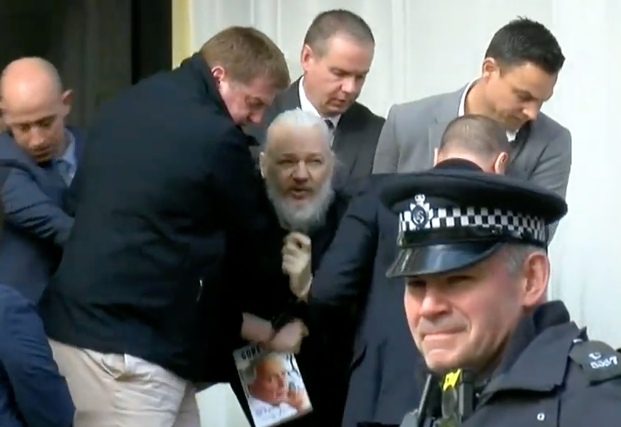Yesterday, a prematurely aged-looking Assange (he is 47) — a founder of Wikileaks and Australian — was arrested by UK Police after the Ecuadorean Embassy he has sought asylum in since 2012 withdrew its protection.

The arrest raises questions on dissidents, privacy, protection of legitimate secrets, the public’s right to know more than officials, power brokers and publicists or other gatekeepers want, and more. (Let us not forget the Pentagon Papers and their impact.) Many of these concerns bleed over into how controversial and sometimes unpopular views like ID will be treated going forward — especially regarding freedom of the Internet.
So, there is relevance.
Again, Daily Mail gives some background:
‘Narcissist’ Julian Assange faces DECADES in US jail after he was hauled screaming out of Ecuadorian Embassy by EIGHT officers, found guilty of skipping UK bail and charged by American government with hacking 750,000 classified documents
Wikileaks founder dragged from Ecuadorian Embassy in handcuffs by large group of police officers yesterday
He has not left embassy since 2012, when he was offered refuge from allegations of sexual assault in Sweden
Arrest was for skipping bail that year and also for a US extradition request over computer hacking charges
Ecuador said decision came after he behaved badly and interfered with its affairs during his seven-year stay
Appeared at Westminster Magistrates Court where he was found guilty of breaching bail conditions in 2012
He faces a further court hearing in May relating to his possible extradition to the US on the hacking charges
But the US is reportedly set to file further charges in the coming days that could see him in jail for decades
Corbyn told [UK] Government not to extradite Assange for ‘exposing evidence of atrocities in Iraq and Afghanistan’
So, hero, villain or a bit of both? In a world where questions of cover-up, conspiracies, character assassination, conspiracist speculation, false flag agit prop operations, propagandistic street theatre, diminished credibility of major media, bias and agendas backed by ruthless power, turnabout accusation and much more are common, where also questions of web censorship are on the table, are we at a watershed?
I forgot: could he have a deadman switch that might be activated to release a huge, damaging, chaos-inducing infodump?
Are there implications for those who advocate views that are unwelcome in halls of power? END